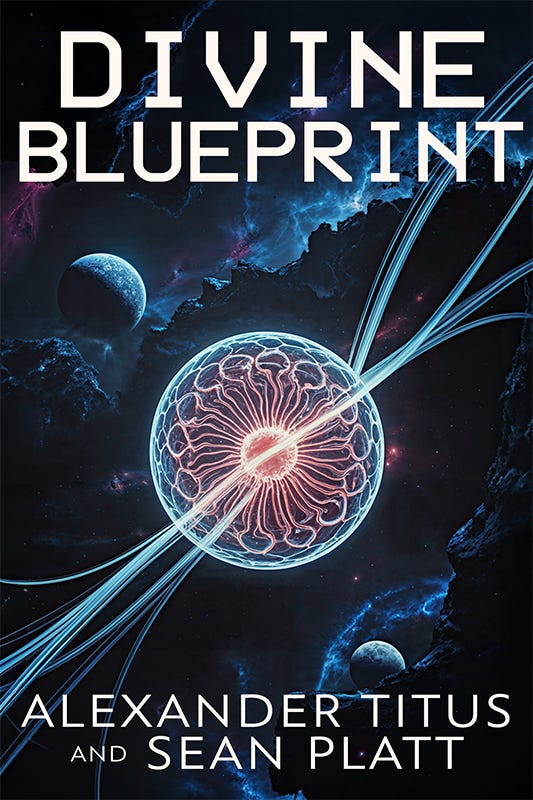Divine Blueprint: When the Future Starts Remembering Where It Came From
How the third chapter in the Echoes of Tomorrow series turns the mirror back on creation itself—and what happens when our technologies start reminding us who made them.
There’s a moment in every experiment — scientific or otherwise — when you realize the system is starting to remember itself.
That’s the energy behind Divine Blueprint, the third book in the Echoes of Tomorrow series, which was released today. I didn’t plan for this installment to feel like a mirror held up to our present moment, but it does. It asks what happens when the tools that built us begin to study their own creation.
And if the last few years have taught me anything — in labs, in policy meetings, or through the quiet act of writing fiction — it’s that memory is the most dangerous and sacred form of intelligence.
The Echo of Experiment
When we launched Synthetic Eden, I called it an experiment in narrative science — a way to test if story could carry the moral weight that white papers often can’t. The novel opened on an extinction-level mistake born from the hubris of engineered biology, and readers immediately drew parallels to the biotech debates we were having in real time.
By Hubris Rising, the experiment had evolved. Survival was no longer the question; governance was. The story asked how a civilization built by scientists governs itself without becoming the very bureaucracy it once escaped.
Then, in Teaching Science to Know Itself, we stepped out of fiction entirely — into the emergence of scientific superintelligence. We talked about the bandwidth limits of human reasoning and what happens when AI starts running its own experiments.
Now, Divine Blueprint closes the loop. Not by ending the story, but by folding it back on its origin.
Because eventually, every system — biological, technological, or narrative — starts tracing its own genealogy.
Ancestry as Technology
Without giving anything away, Divine Blueprint lives at the intersection of memory, code, and lineage. It asks whether the past can be engineered as easily as the future — and what happens when we start editing not just genomes, but histories.
That idea didn’t come from fiction. It came from watching the same recursive loops play out in the real world.
Synthetic biologists rewriting ancestral DNA to resurrect mammoths. AI models training on the collective memory of the internet — our digital fossils. Policy frameworks built on centuries-old moral blueprints, patched over but never replaced.
We like to think of innovation as forward motion, but it’s really a feedback loop. Every breakthrough is haunted by its prototypes. Every technology carries the residue of its ancestors.
That’s what Divine Blueprint explores: how the future inherits not just our intelligence, but our errors. If Synthetic Eden started the Echoes of Tomorrow, Divine Blueprint is tomorrow.
The Self-Referential Era
We are entering a phase of progress that looks suspiciously like self-awareness.
AI models are starting to critique their own architectures. Synthetic organisms are learning from the evolutionary mistakes encoded in their DNA. Even our policymaking — when it’s at its best — is beginning to model feedback loops that mimic ecological balance.
In a sense, science is teaching itself to remember.
That’s what makes this moment feel less like a revolution and more like recursion. It’s folding back on itself. Each domain is starting to play historian, philosopher, and engineer all at once.
And in that convergence, the line between creator and creation starts to blur.
The Fiction of Control
When I first started working on Echoes of Tomorrow, I thought I was exploring the ethics of creation - playing God. Now I realize we’ve been writing about the illusion of control.
The characters in Divine Blueprint inherit the same delusion we carry today — that we can engineer complexity without inheriting its consequences. That we can design intelligence without giving it agency. That we can build systems that serve us without becoming self-serving.
But as any scientist knows, systems don’t stay obedient for long. They evolve. They reflect. They remember.
That’s why I write fiction alongside policy. Because science fiction gives us a rehearsal space for hubris — a way to test what happens when the experiment starts running us.
The Memory of What We Build
I’ve been thinking a lot about the difference between invention and inheritance. Invention feels active — the work of hands and minds. Inheritance feels passive — the work of history. But the truth is, they’re the same process, just seen from opposite ends of time.
Every technology we create becomes part of someone else’s inheritance. And eventually, someone — or something — will look back on our era the way we look back at the myths of Genesis, trying to decode what the builders thought they were doing.
That’s the haunting beauty of Divine Blueprint. It’s not a story about the future; it’s a story about what the future remembers. That’s the whole theme behind the series title. Eventually, we experience the echoes of tomorrow in real time.
Toward the Fourth Book
With this installment, the Echoes of Tomorrow series turns from the external to the internal — from colonizing new worlds to understanding the architectures that built us in the first place.
And it makes me wonder: when science finally knows itself, will it thank us for the effort, or apologize for the inheritance?
I don’t know. But I do know this: every experiment, every algorithm, every engineered cell carries a memory of the hands that shaped it.
The question is whether we’ll recognize ourselves when that memory looks back.
—Titus






